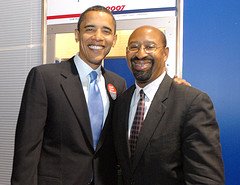(ThyBlackMan.com) PRINCETON professor Cornel West has been embroiled in a controversy with President Obama over the past two weeks after calling him a “black mascot of Wall Street oligarchs and a black puppet of corporate plutocrats,” and criticizing his handling of black unemployment and lack of race-specific social policies.
Implicit in his criticism was the idea that Obama had a unique obligation to the black community because of his own racial affiliation.
As expected, people on both sides of the political aisle jumped to Obama’s defense, claiming that he is the president of all Americans, not just black  Americans. They argue that it is unreasonable for black people to expect special benefits from Obama simply because he is black.
Americans. They argue that it is unreasonable for black people to expect special benefits from Obama simply because he is black.
I agree. Sort of.
From a political perspective, black Americans shouldn’t expect President Obama – or any other black politician – to deal with black issues because of his race. We should expect him to deal with black voters because we are citizens, because we have particular needs and because we voted for him in higher proportion than any other demographic group in history. Not because he looks like us.
(Side note: That’s from a political perspective. From a personal perspective, I believe that there’s a special place in hell for black politicians who don’t support black interests.)
Unfortunately, we live in a world in which black people are considered untouchable and unmentionable by politicians. This is why Obama went to such extravagant lengths to avoid discussing race during his campaign. He understood that to talk about race was to make him a “black candidate” rather than a candidate who happened to be black. This is equally true in our local political scene, where any form of “race talk” makes white voters uncomfortable, undermining a candidate’s chances of being successful.
This is what former Mayor John Street was articulating, however inartfully, when he said that Mayor Nutter wasn’t black enough for many citizens. He wasn’t questioning Nutter’s racial authenticity; he was correctly challenging his commitment to advancing policies that uplifted black Philadelphians.
The problem, of course, is that Mayor Nutter (like President Obama) did not run as a black candidate. In fact, his success in 2007 hinged largely on the fact that he was the most appealing to white voters. Unlike the other black candidates, like Dwight Evans and Chaka Fattah, who had strong grass-roots ties and unabashed commitments to black upliftment, Nutter boasted an Ivy League pedigree and a willingness to endorse draconian public policies like stop-and-frisk, an unconstitutional policy that has a disproportionately negative impact on young black men.
To be clear, I’m not suggesting that Mayor Nutter isn’t proud of being black or that he doesn’t care about black people. I’ve known (and liked) him for many years and have no doubt that both statements would be untrue.
But Mayor Nutter certainly isn’t a black mayor. He is a mayor who happens to be black.
Like Obama, he’s never pretended to be anything else. If you voted for him and don’t like his colorblind approach to governing, then you have no one to blame but yourself.
In the future, we must stop confusing symbolic black leadership with real leadership. Just because black people are in office doesn’t necessarily mean that we’ve made racial progress. After all, our ancestors didn’t march for us to get mistreated by black teachers, beaten by black cops or sold out by black politicians.
When Mayor Wilson Goode bombed a residential block in 1985, murdering 11 people and destroying 61 houses, the innocent victims didn’t feel any better because the chief executive was black. When Mayor Nutter proposes library closings and endorses the civic terrorism of young black men, it doesn’t help that he can trace his roots back to Africa.
As Zora Neale Hurston once said, “All your skin folk ain’t your kin folk.”
Instead of questioning how “black” our politicians are, we should be asking how black (or Jewish or gay or working-class) their agendas are. Instead of finding pride in seeing our faces in high places, we have to fight to see our issues being addressed at the highest level.
Until we do that, we will continue to suffer. And it will be due to our own political immaturity.
Written By Marc Lamont Hill
Via; http://Philly.com

















“Just because black people are in office doesn’t necessarily mean that we’ve made racial progress.”
WOO!! WOO!! Not SO FAST!!
The very fact that Black’s are in office (especially a national office) means we have made a lot of racial progress. I remember days of segregation, and REAL bigotry and racism. Back then Blacks couldn’t get enough White votes to be elected to anything.
Yes we’ve come a long way racially and we need to act like it, take advantage of, and stop being Fools for the folks playing the race cards.
why should color/race be an issue we all bleed red and under skin we are all pink we all need air and we are all human